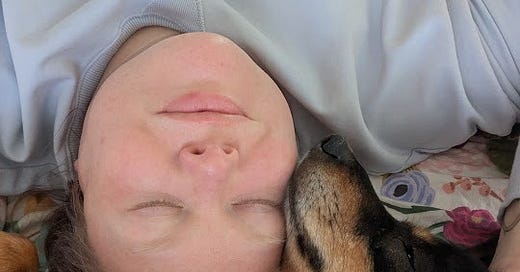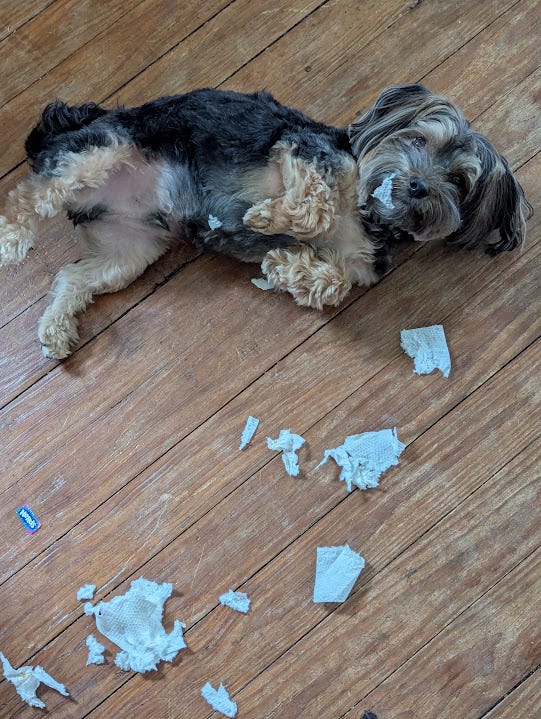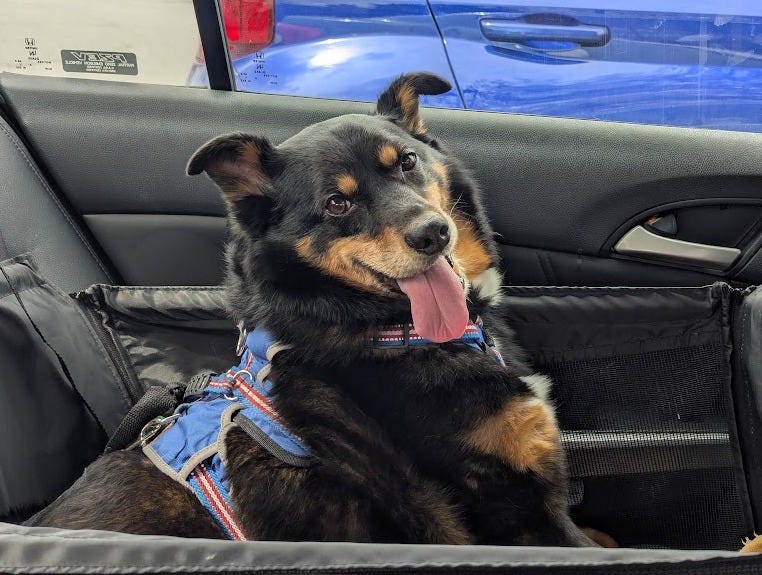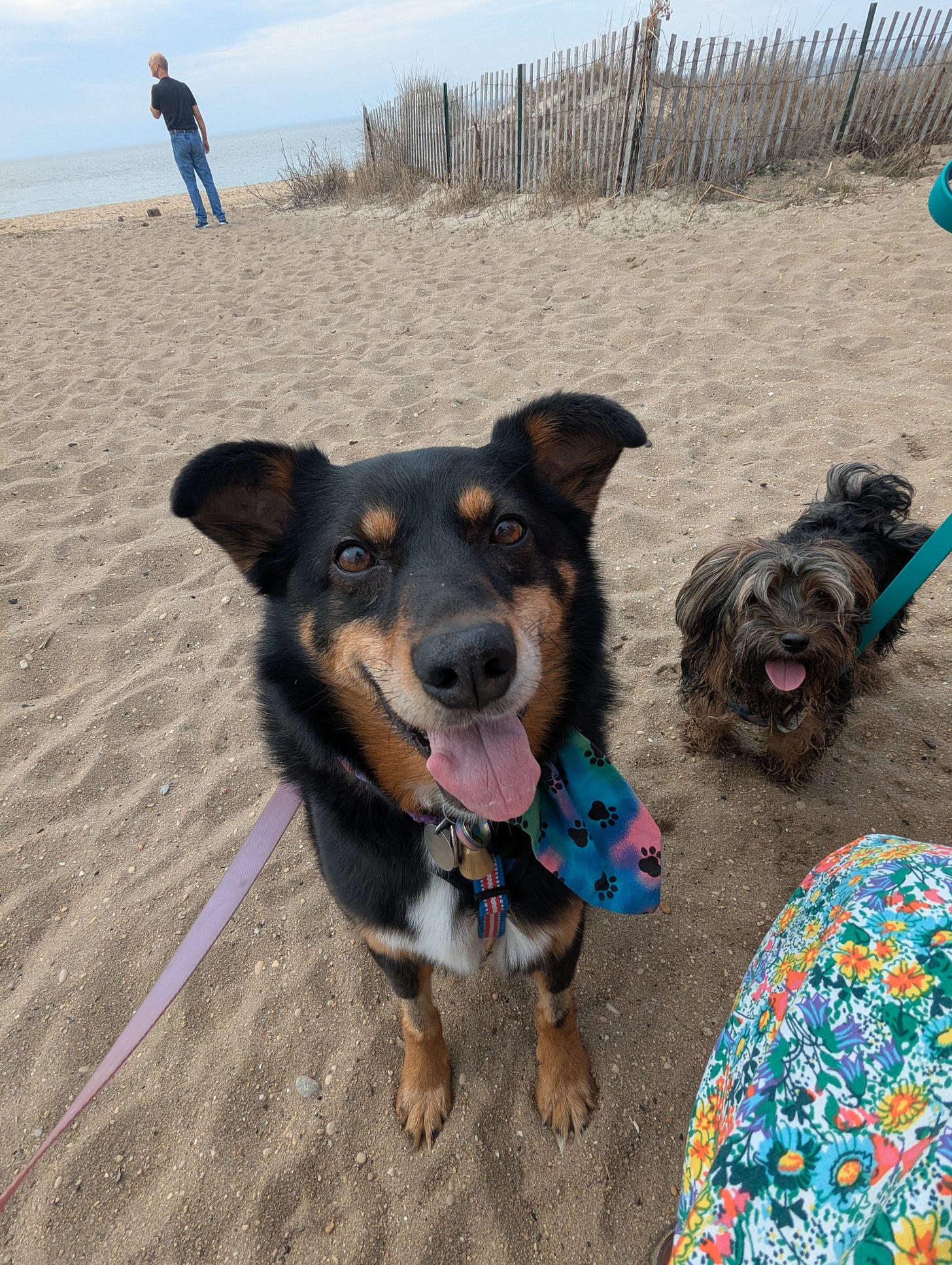I could flip a coin and whatever side it landed on would be a valid hall pass:
Holy shit this is really hard and terrible and
No one wants to read you talking about sad shit.
Every time I have begun an update, my brain screams
NO ONE NEEDS THIS PONTON THINGS ARE BAD ENOUGH
But I am all too often wrong in my assumptions. I don’t get to tell you what you do and don’t want to read, of course; you get to decide that.
Especially because… I need sad art.
I like having my heart (safely) cracked open to witness and connect with someone’s pain and resilience through words or paint or music, and feel a little more magically human on the other side of it.
And especially-especially because… it’s not all sad?
I mean, I won’t mislead you, it’s pretty fucking sad, but the glimmers of presence and relief and joy sparkle all the more brightly against the darkness. The time that I have right now is a beautiful gift. And I’m so relieved and grateful that I can get out of my own way enough to be here for it.
The Pretty Fucking Sad
Bear began to decline pretty quickly. A ballpark figure that presumed I might have a few peaceful months with him shriveled to weeks when his seizures returned. I noticed strange cognitive changes, like him waiting on the wrong side of the door, or getting lost in corners.
An option that had initially been presented to me was the possibility of a highly-concentrated radiation called SRT, a tumor-shrinking commando with volumes of statistics attached. The thought of it all felt overwhelming and traumatic to put him through—a dog who, as far as I could tell, wasn’t experiencing suffering. The thought of compromising his peaceful last chapter by throwing radiation into the mix didn’t sit right with me. But when his seizures came back, suddenly it didn’t seem like I’d ruin anything; it seemed like the Hail Mary that could indeed give us those hoped-for peaceful months together.
Five weeks after I initially rushed him to the hospital, he began his SRT. Unlike typical radiation, this didn’t require daily visits for weeks on end—it was just a course of three quick days. He’d have to be fully anaesthetized in order for them to dose the exact coordinates of his brain tumor. I’ve learned over this very long two months that trying to care for Bear post-anaesthesia is like trying to pin down the white rabbit. Instead of long, languishing naps, he surges to his feet, panting and pacing for hours on end. He can’t be coaxed or contained, and the confusion from the anaesthetic makes him even more dead-set on clearing his head.
Immediately before Bear’s radiation began, we had what I can only describe as the gnarliest 48 hours of all time. Arlow went to the ER with pancreatitis, a disgusting (and terrifying) tornado of gross things. There was always a load of laundry getting sanitized and a spray bottle of bleach on-hand as he just… evacuated.
The night before his first SRT treatment, Bear joined in, immediately giving back his whole dinner along with The Pills He Must Take Every Night For His Seizures. I fished the pills out of the pile that was (almost) too fresh to be gross. Forbidden to crush them, I placed them back in his mouth like a quarter at a payphone and waited for them to go down. Within minutes, they came back up, ushering in a night of following him with bleach spray and laundry, trailing a roll of paper towels. Neither of us got more than an hour or two of sleep.
By the time morning came, I’d almost forgotten he never took his meds. I was reminded immediately when his body corkscrewed into a grand mal seizure. Arlow howled as I ran to get his Emergency Meds, a laughably intricate Rube Goldberg mechanism that will eventually spray an anti-convulsant up his nose and into his brain, if you can
a.) stop crying and panicking enough to do all the steps correctly, and
b.) get a seizing dog steady enough to place a small cone up his nose.
I’d fucked it up before and I fucked it up again, firing a precious spray into the air as he writhed, restarting the whole process, and finally landing it home in his nose. His flailing limbs surged harder and I was certain I’d really done it now. His limbs quieted and his eyes went blank, unable to track my fingers with his gaze or acknowledge cues. It was just a 3-minute seizure, but he had gone hard. The hospital wasn’t even open for me to ask them what I should do. I absently handed him his Morning Seizure Pills and fiddled with a pull in my shirt for 63 minutes until they called me, telling me that even after everything his poor little body had been through, it was safer to begin his SRT today rather than to wait.
I brought him to the hospital and whispered little love notes into the flat plate of his forehead until they took him into the back. They promised they’d stabilize him before doing anything, frontloading him with IV fluids, anti-nausea meds, anti-diarrheals, and anti-convulsants before anything else. Doc and I waited in the lobby for six hours until they brought him back, loopy and anaesthetized, but successfully zapped by the photons doing the Plutonium Jive with his tumor. With the night we’d just had, I was hopeful he’d finally rest, and his doctor assured me that he would.
Exhausted, dehydrated, fasting, and just 12 hours after his seizure, he started pacing like a caged tiger and didn’t stop once. The hours rolled by—2, 3, 4—his little staccato paws clicking forward and back.
He kept this up for twelve hours.
When I woke up just to watch him faceplant against a cabinet and slide down like Wile E. Coyote, I refused to move him, just grateful his body could finally get some sleep.
We took him back to the hospital, where the procedure took a fraction of the time. Despite the dampened drama of the day, when he came back to the lobby, he looked… different? More absent? I appreciated how reserved his doctor was in his prognosis; she knew I was nervous, and that the nature of his tumor wasn’t likely to result in a miracle. She thought his vision may have been affected, and if we noticed any cognitive changes, to bring him to the ER.
After a deeply-needed nap, I woke up to that same post-anaesthesia pacing, but… worse. Weirder. He got stuck in corners. He meandered under the hanging coats and started to panic. His eyes looked strange, like he was doing an impression of Peter Lorre, neither quite coming center. He’d seem to want to go outside, but when we did, he’d just sit in the road. Close to midnight, he began to yelp in what I’ve only ever heard from him as pain. I came close to him, looking at his face. It was changed, different, not him, like all the fine muscles underneath had arranged themselves into a different dog.
“I have to take him to the hospital,” I said to Doc.
I don’t recall ever being so unreasonably calm as I was on that midnight drive. He yelped throughout, and I told him we were going to the ER, and I was going to get him help. When we pulled up to the door, the parking lot was empty, and he stopped his cries immediately.
“You wanted me to take you here, didn’t you? Such a good boy, telling me.”
We walked inside and were ushered into a room with soft lights and a YouTube Pastoral Scene playing on the television. Oh no. The Goodbye Room. My calm wavered as I grappled with the thought of going home alone from here, now, after all he’d been through. I looked at the clock. 1am. I hesitated for a moment, then called my friend on the West Coast. She picked up immediately.
“I know it’s late. But I’m at the hospital and need to know Bear’s wishes.”
A gifted seer, she had channeled Bear a few times since his diagnosis. Her readings have been precious milestones, helping me create a values-based map of what Bear wants and needs. She got quiet for a moment, then:
“He’s really hot and he can’t cool down. Can they give him fluids?”
The doctor told me she was concerned it was edema by way of radiation toxicity, a condition that was the worrying fine print of SRT. 80% of dogs tolerate the radiation with no complications; 20% require emergency care to reverse and control the swelling of the brain. It would require a hefty dose of mannitol—a cerebral and ocular diuretic—along with a recommended overnight observation.
The thought of not being in charge of his mortality was a sweet balm indeed. It was 2am, and the lure of just one uninterrupted sleep called me like a siren.
“Honestly, that sounds great. Oh, uh—could you also give him fluids?”
“Oh, the mannitol is in fluid.”
“Yeahbut—can you give him, like, a big bag of fluids?”
Amiable enough, she agreed, and they toted in an IV cart with the bag of mannitol, leaving Bear and I alone as it dripped. He panted, refusing to lie down, still pacing as I followed him with his IV tubes, keeping them from tangling at his feet. As the bag emptied, I could see the smallest change in his face—just an edge off the panic and exhaustion, a slight softening of those fine muscles. His vet tech came in to swap the bags, cradling a great big sack of saline in her arms like a baby. She hoisted it onto the hooks and plugged it into Bear’s IV, then left, the door clicking shut.
It’s coming honey, here it comes
I whispered to him as the minutes clicked by. His panting slowed, his face cleared, and my restless boy circled once, twice, then lay down on the blanket they’d put down for him. He took a Great Big Dog Sigh and my body went with him, shoulders dropped and air spent.
They sent us both home at 3:30, certain that he’d fare better with me than without me. As I bundled him into the car in the empty parking lot, I stole an extra glance over my shoulder before asking: If you want to stay here for the night, let me know, okay?
Not a peep from the backseat, just Rick Springfield’s voice in the wee hours.
The salt-and-pepper tomato and mayo on sourdough I made at 4:30am was the best thing I’d tasted all week. Bear was somehow back—still pacing, panting, doing the Anaesthesia Rag—but back, his face assembled correctly again. I lay down at 5 and hoped he’d be soon behind me. When I woke up at 6:30, he was curled at my feet.
Doc came downstairs bleary-eyed, blinking at Bear with dubious wonder. They moved to pet his head and he yelped, his whole body a bruise. He could barely move. We tenderly removed his harness, gathered him in our arms, and spoon-fed him blended chicken and water, gently coaxing his pills down.
It was supposed to be his final day of SRT, but my mind was made up. It felt like a miracle that he was still here. To bring him back, to chance another close call, was undeniably pressing my luck. Besides, this was not an all-or-nothing treatment—each day would build consecutively on the last, and to quote the bard Meatloaf: two outta three ain’t bad.
With a narrow prognosis window of “weeks to 2 years,” it was hard to feel like the third treatment was critical for the best outcome. Every projected statistic in my SRT workbook was based on a massive range of dogs of all breeds, ages, and sizes, with all kinds of cancers and tumors. Some dogs lived for a mind-boggling several years past their best-by date, some had unresponsive tumors which continued to grow like poison ivy. His oncologist kindly let me know that my choice was understandable, and that he would still presumably glean the benefits of what he had done.
The Not-So-Bad
Sleep came, eventually. For the tender days after, Bear was alert and panting every hour, on-edge with Prednisone and lingering anaesthesia, needing a little water or a kind whisper and a headpat. But with the hours and days, everything softened. It was a joy to simply feed him, not needing to fast or deprive him for surgical prep. The pacing slowed and stopped, his fishy Peter Lorre eyes now front and center, and two nights later, he was able to go up the stairs and sleep a well-deserved sleep in my (his) squishy pillowtop bed.
Let’s, for a moment, put aside what it means to be palliative: to have a problem that cannot and will not be solved, to be en route to the final stop on the journey.
What might feel expansive about it?
Slow-dandelion days that shoo away cares like vet visits, tooth cleanings, vaccinations without a lollipop. A sudden welcoming of table scraps and shameless begging, the delight of his first ice cream cone. A beautiful centering and grounding of this: the final chapter, so by God, enjoy it.
As the sunrises creep earlier, I notice his cognition improving. I realize with delight that I was so eager to end radiation, I almost forgot the whole point—I can’t know it for certain, but I think his tumor is shrinking. Little by little, he comes back to his senses, my loving, crafty, clever boy.
Spring bursts forth like a peony and our days ripen with treats, car rides, adventures, and reasons to linger outside. His legs are wobbly and unsure in the car, so I get him a bucket seat, his little snoot still pointed towards the open window.
A day at the beach necessitates a 5th grade chaperone amount of prep—
okay, medications and supplements administered 11 times per day, here’s each dose labeled in a pastel-colored Tupperware with a little bit of baby food or chicken and rice, triple-check the alarms are set, don’t forget the treats or the water or the Emergency Rube Goldberg Torture Device, don’t forget the long leashes and the short leashes, is this the right harness???
—but it culminates in a joyful trot in the sand, zippy laps of salty, frigid Atlantic, and meet-cutes with other dogs that take years from his face, play-bowing and juking (and eventually humping) them.
Every day is a fresh-picked orange—how fragrant, zesty, juicy can it get?
Morning puppy massages in bed, finding all the best sticks to give to him outside, little collaborative art projects, getting a bite of anything I’m cooking, along with an astral amount of CBD. The days pass in dog-minutes, because I’ve changed my watch to match him. Away go my goals and schemes, out comes my sunblock and unread books that have been waiting for me to slow down to spend some time with them.
And something unexpected has happened to this chronic worrier, to this future-tripping anxiety machine. I spend my days not devastated for tomorrow—or next week, or month, or season—but really, truly, right here in the joy with him, meeting his doofy smile with my own as he sneezes two whole times right into my face. Feeling like this day in the sand and surf might as well be forever, because with him, it is. My grief peeks in on me sometimes—checking on me during a shower, blindly groping at what his absence might feel like—but for the most part, it gracefully waits its turn.
For now, there is a belly to rub, a window to roll down, a long sigh in a sunbeam.
xxJen










💜💜💜💜💜💜💜💜💜💜💜💜
Love you. 🥰